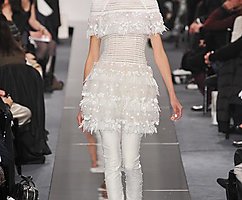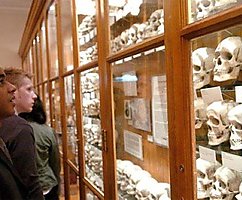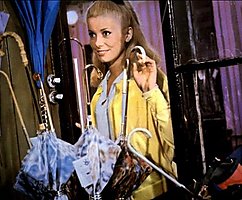The story of how scientists searched for it in the mind of the journalist
 Bashny.Net
Bashny.Net
Six months as a test I went to the experiments, the neurolinguistics laboratory, HSE. Being the object of the research, I tried a little bit to understand in the interaction of language and brain. 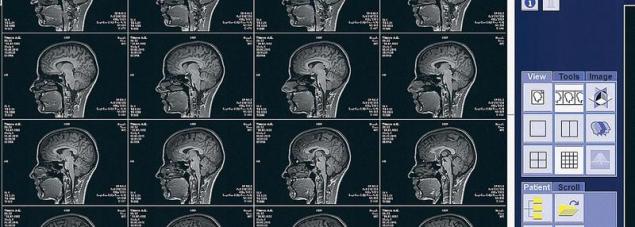
Experiment No. 1: "Boo, Boo, Boo..."My perception of the Room with the MRI so white and clean that it is difficult to distinguish the floor from the ceiling. This becomes even colder. Ring and belt with the buckle removed. Dentures I have not yet, a heart stimulant, too. Like ready. Throwing off the shoes, go barefoot on the tiled floor. Lie down on the couch. My head covered with a plastic lattice-like mask resembling a knight's visor. Stirring the head, as, indeed, other parts of the body, it is impossible. All I see is a reflection of the large screen with the text of the task in the system of small mirrors placed in front of me.
Put on the headphones connected to the neighbouring room with a thick rubber hose. Couch slowly drives into the machine.
Today I'm participating in one of the experiments scientific the neurolinguistics laboratory, HSE. Created just a few years ago, she brought together neuroscientists, linguists, speech therapists and even programmers, who are learning our language as a direct product of the brain.
How connected language and the brain, scientists are trying to understand for a hundred years. But the real revolution began in our time, when it became available scanners and other devices that enables detailed monitoring of brain function.
From these studies, two global problems. The first fundamental is to understand how neurons work in our head into words and sentences that we understand or pronounce. The second task applied to help people who have for brain disorders have problems with speech.
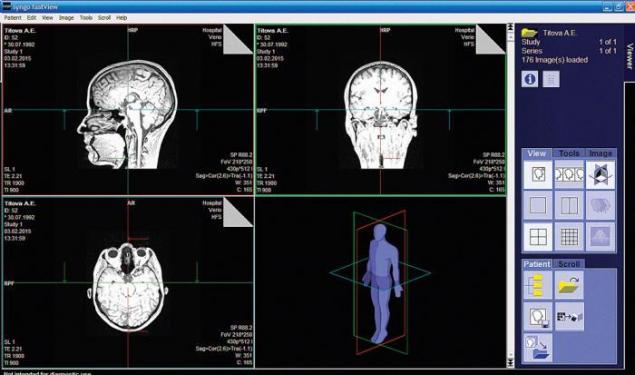
Probably the best way to see how the brain controls speech, is a functional magnetic resonance imaging, which accurately identifies what area of the brain is active and what is not.
In the tube of the MRI scanner can feel the solemn loneliness of an astronaut enclosed in a space capsule, which is about to explode to the stars. In an alarming rattle of machine imagining rapid pulse of the heart. He complained of buzzing all over the room, creating a magnetic field around me, and I can't get rid of the obsessive feelings that the machine is reading my thoughts.
The experiment starts.
— Say sentences about yourself — hear headphones quiet voice of the researcher.
"Now widow finishes cherry liqueur".
It is funny, but not much fun: spoil the statistics.
Then it gets worse: "Svaka wasurete plamika dasa shutlivo".
And finally, the climax: "Boo, Boo, Boo Boo buuuuuuu".
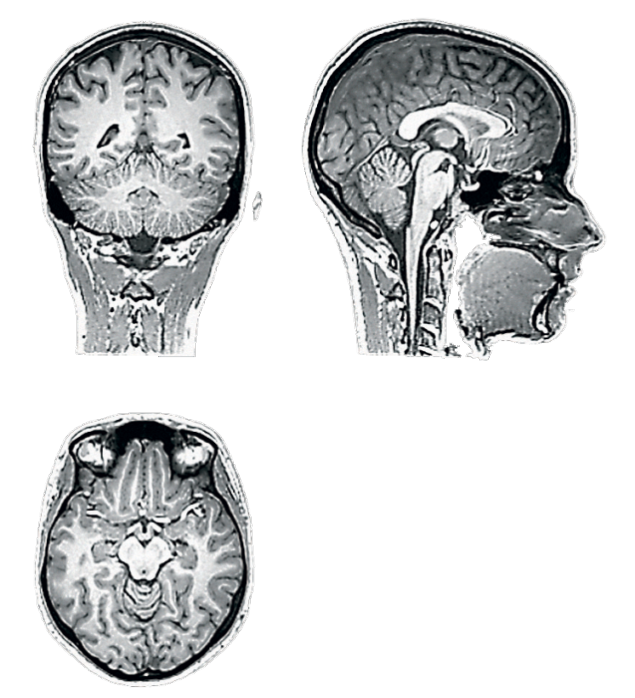
Honestly and quickly read syllables.
Between human suggestions, and almost psychedelic nonsense syllables on the screen each time for a few seconds calming crash simple crosses. In these moments of relaxation I can think of a lot of questions: why is the sentence funny? Out there do you see on the monitor as funny to me?
What does it all mean? If you are right handed, the area responsible for speech, you have most likely located in the left hemisphere. In the nineteenth century, scientists noticed that the speech disorder most commonly associated with lesions in the left half of the brain. However, around the same time was recorded exceptions to this rule: left-handers of the lesion parts of the brain on the left side did not cause any speech disorders. That is, the vast majority of right-handed earthlings speech "is" to the left. A significant proportion of the genetic left — right.
— Of course, it's not a whole meets only one hemisphere. In addition, she has, if I may say so, there are different levels of location. Phonetics, semantics and syntax can be localized in different hemispheres, explains responsible for this experiment, the neuroscientist Rosa Vlasova.
She was always very focused and tells about the brain as about old chess opponent, whose moves analyses for many years.
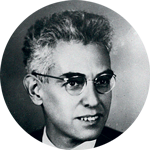
Alexander Luria , the Russian specialists working with the gray matter generally adhere to the teachings of the famous Soviet scientist and founder of Russian neuropsychology, Alexander Luria. According to his concept, any mental function is a system that is re-harvested each time depending on the conditions in which proceeds human activity and what its job is.
The difference found in the organization of speech in right-handers and most left-handers, gives limitless expanse for new hypotheses and possibilities for experimentation. Sixty years ago, the founder of Russian neuropsychology, Alexander Luria received, for example, the following data: right-handed, whose family tree has relatives or ancestors with the leading left hand after brain damage regain it faster compared to right-handers, whose families left-handers and there was not.
The purpose of the experiment with the MRI — to confirm the available evidence that the speech in right-handers with familial left-handedness "located" differently than right-handers without it.
How to check When I'm lying in the pipe, region of the brain involved in the task, begin to work actively, and hence are very active to eat is to absorb oxygen. To these sites begins to see an influx of blood rich in glucose and oxygen. However, since the oxygen (oxide hemoglobin) to flow in abundance, he is not completely consumed and accumulates in the venous blood near working cells. Oxygenated hemoglobin has paramagnetic properties, and using fMRI you can see which of the sections of my brain are currently active.
Why such a complex experiment design: clear suggestion, then incomprehensible, and then another, and syllables?
Scientists are looking for a kind of pure speech, but when you do the job, aktiviziruyutsya attention and visual perception, and even hidden articulation. So there, the test conditions — those strange sentences with non-existent words. When a person reads these pseudophase, areas of visual perception and the hidden articulations are approximately in the same way as in the normal range. But the areas responsible for the semantics, i.e. the meaning of the words is not involved, because these words simply do not exist. Thus, comparing these conditions, scientists find areas responsible for the sense of the words: they glow brighter when we read the usual suggestions.
Over these strange pseudotrisomy was not a linguist. First, all words cited in the initial shape, then removed all morphological features, then the combined syllables so that they did not develop in pseudoloma similar to the real thing.
Noughts and syllables in this experiment — kind of the perfect benchmarks, which compares brain activity at the time of execution and failure of the task.
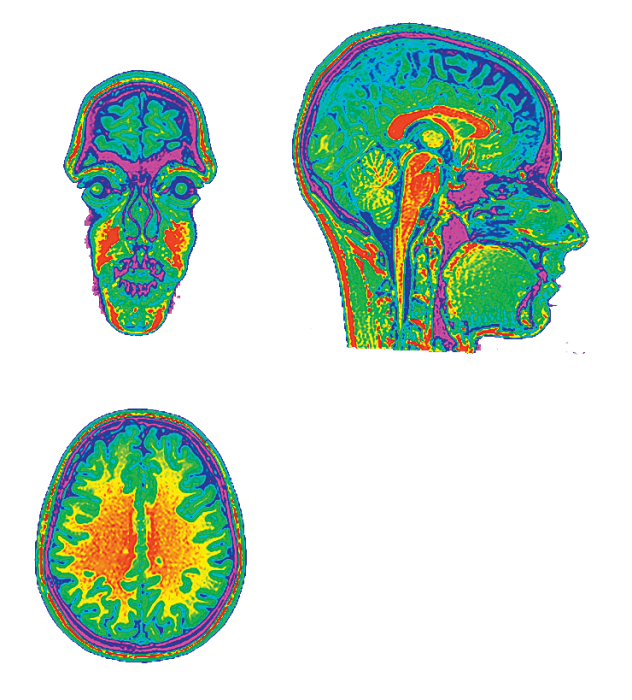
Of course, take literally the thoughts according to the fMRI can not (phew!), but what sort of apparatus all the same blab. Guess what I was curious about you drawing attention to the activation of the areas responsible for attention. It's easy to calculate the subject who fell asleep. Although, they say, in some experiments, and to sleep is not a sin. For example, in phonological. The brain will work without your direct involvement. You headphones pour the syllables "BA-BA-BA-BA", and then a sudden "PA!" and the experimenter will immediately understand that the brain is an audible difference noticed if you see the tenth dream about aliens.
Results While this difficult experiment is in the development stage. It turned out that different subjects should be produced by different control conditions. And someone has to do, instead of faithfully reading the syllables, just sings them to herself.
— When some of the subjects we see activation in the temporal lobe of the right hemisphere instead of the left, once it becomes clear what it is. There is a dichotomy: with the defeat of the left temporal lobe there is a speech, whereas some lesions in the right temporal lobe — impaired perception of music. Well, we asked you was not sang by chance? — shrugs rose, surprising me with his detective skills.
My scan came through a week. Turns out my it lives in the right hemisphere, despite the fact that I am right-handed citizen without grandmothers and grandfathers left-handers. So the results of the experiment the scientists I'm probably spoiled. The brain can and so. At least my brain.
Experiment No. 2. How to lose the gift of speechMy feelings — What are you so bald on the monitor is spinning?
— Your skull — cheerfully greets me student of pigface HSE Intern researcher at the laboratory of neurolinguistics Zoya Cherkasova. — Now we compare the 3D image to a computer program with your head in the real world.
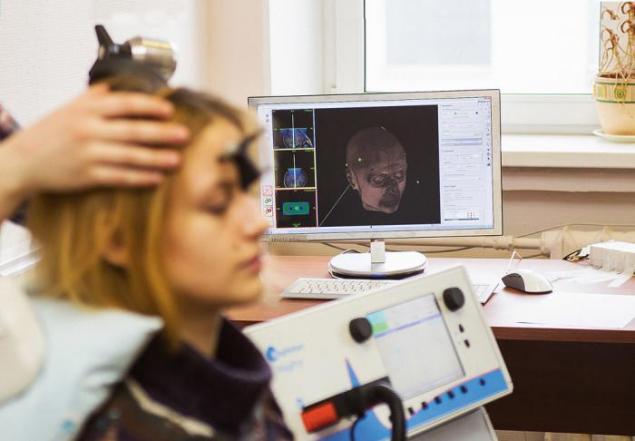
Looks not very pretty — well, with a hairstyle under a zero wait a little while.
Laboratory for cognitive studies — a small room office, where barely fit a dozen students. Never guess what here doing cool experiments.
The wall is a tremendous snow-white chair of the test — exactly-in-exactly in the dentist's office. Only here for fun. First, it does not hurt. Secondly, it is not boring: the laboratory is in constant motion. Sit down.
Here the young doctor thoughtfully rotates on the monitor in multi-colored 3D coordinates of some pink squiggles.
— What you have a beautiful brain! — admires his colleague.
That's because he's faux — sigh black-eyed scientist.
Zoe clips on my forehead, small gray beads, through which the camera "sees" my head. According to its accurate geographical coordinates of the computer program, to compare with "entrails" of the brain image was obtained in the experiment with the scanner.
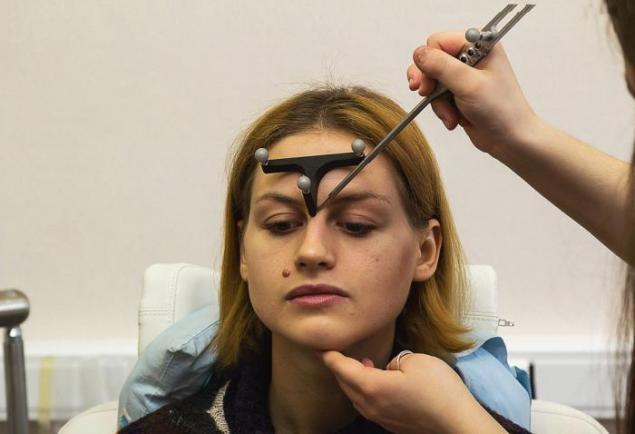
Now experimenters need to understand the force with which at me can be hit with a magnetic pulse.
And for this I need to connect to the appliance: the left arm electrode attaches Zoe, on the right is the main controller of the local superoperator a Sicilian, Matteo Feurra. It can rather be mistaken for a designer fashion house Romeo Gigli, than for the associate Professor of the faculty of social Sciences. The scientist had a choice to teach in Spain, Germany or Russia, and in the end, he went to Moscow, because here was the best equipped lab. Here is generally a lot of foreigners for this reason. Here to the fridge rapidly approaching the Montenegrin Nikola Vukovic. "No beer," the mysterious, as if some secret password, he says in Russian across the room, slams the door and disappears with a lot of drugs.
— Discharge! — twitching hand, jumps on the monitor chart.
The scientists nod to each other knowingly — apparently he found that the force of impact at which the signal can break through the skull to the bodies of neurons, and I'm not hammered in convulsions.
Matteo solemnly gives Zoe a big black solenoid coil. It is similar to a thick monocle with divisions.
Now look at the scalp! — command of Italian.
Zoe obediently leads thing on my mind.
So, two hours of preparation, and you can begin the experiment.
I sit in my chair, with me is Zoe with the coil, I monitor with the task. Around the audience.
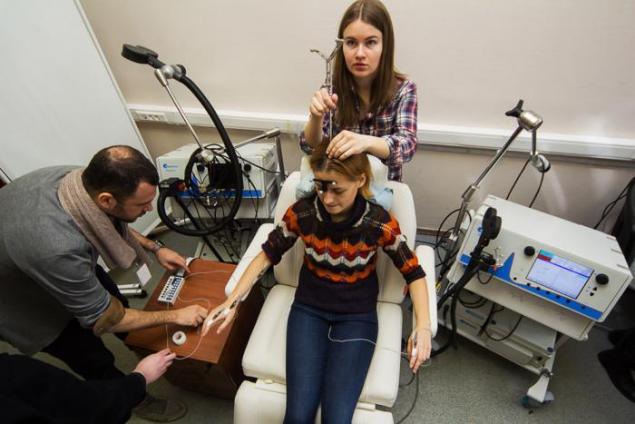
My job is to call out nouns and verbs according to the pictures. What could be easier?
Pictures flashed on the monitor with frightening speed.
A shovel and a beacon I called immediately, but the fire extinguisher and easel out of my head completely.
Verbs even more interesting: a man feels a woman up the ass, man choking man with a rope...
The first round is over. Now I will say the words while under the influence of a magnetic field.
This Behemoth!
I clearly see an animal on screen, but Zoe suddenly treacherously shoots me in the head electromagnetic bullets — BAM-BAM-BAM! I'm trying to say the word, but my fat Hippo blown in articulating the impotence somewhere on the way from the brain to the tongue. It's like a monologue with a headwind, when some invisible force like scores all the words back in your mouth. I'm, like, speechless — nothing to say!
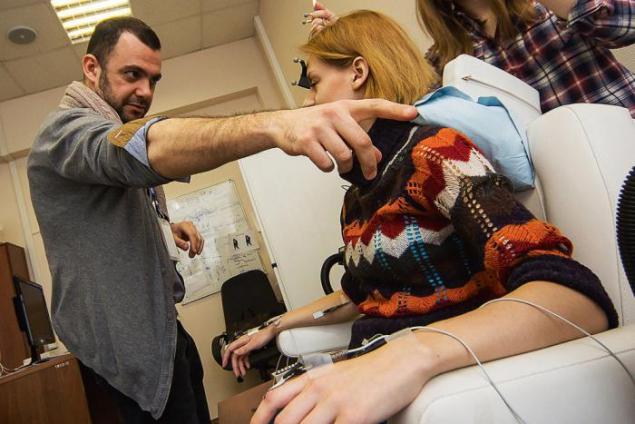
What does it all mean? The point of this experiment is also associated with left-handedness. If in the chair the subject is sitting classical right-handed, the speech functions concentrated in the left hemisphere, then when you disable zone Brock he got worse to call verbs, because at this point, the test block region responsible for motor skills. And when he sends the pulse to the zone of Wernicke is worse to deal with nouns. It is also clear that if left-handers have speech centre is on the right, and brake when they have impact on the right hemisphere.
How to check so attached to my forehead sensors and associating the camera with fMRI data, which were already in a computer program, the researchers asked the coordinates of the desired speech zones in the program and determined their location in my head. Then found out how hard it is possible to stimulate selected points in the brain, by measuring the threshold of sensitivity that all people are different and depends on the degree of fatigue and the thickness of the skull bones.
The method of transcranial magnetic stimulation (TMS) on the impact on the cerebral cortex with short magnetic pulses, resulting in \ \ broken the local processing of information. In short, TMS affects the brain temporarily, allowing you to disable some of its area (in a healthy person) and analyze how this affects speech.
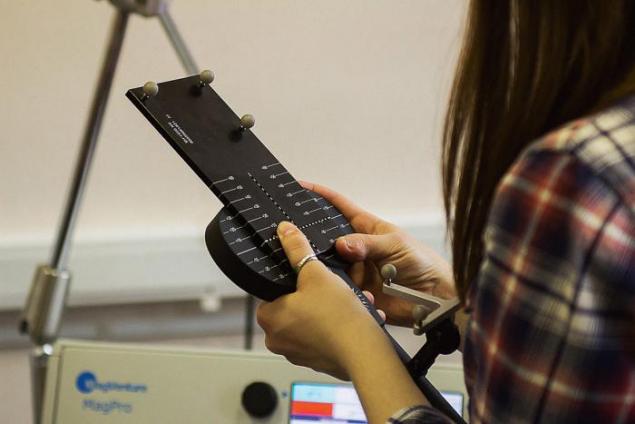
About the possibility to influence the brain using electromagnetic fields, scientists said at the beginning of the XX century. But serious experiments with transcranial magnetic stimulation began in the mid-90s (primarily in the treatment of mental illness), and in Russia this technique was legalized by the Ministry of health less than two years ago.
The results Here, in contrast to the previous experiment, results for a long time did not have to wait.
— You have some reason problems arise with the naming during stimulation of vertex, says Zoe, confused lowering the coil. Actually there is no speech zones. It's the center of the head, we wanted to use as a reference point...
So my brain replays we scientists have with the score 2:0.
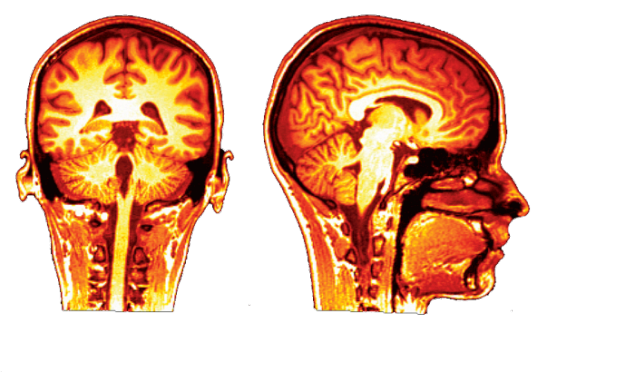
Experiment No. 3 "the Mistress breaks a vase with a plate"My feelings Senior researcher of the laboratory of neurolinguistics Anna Krabis — graceful and delicate, which probably needs to be a girl, professionally looking in someone else's brain. In a small laboratory at the Moscow Center of speech pathology she slowly writes in the history of science different patients with speech disorders. Well, today I will take part in one of her experiments.
Again I'm looking at a computer monitor, but this time I have to do job independently devices — you can spin and grimace, you are no wires or cold pipe of the imager.
On the keyboard two buttons. The red and blue. With their help, this task is performed by the patients of the Center, which, as a rule, after the injury can choose to answer slowly and only with one hand.
— Your task is to listen to the sentence and quickly choose the corresponding picture.
Go!
"Mistress smashes a vase plate".
On the monitor two drawings of a woman, equally, indifferently destroying the dishes. She left pounds a vase on the plate. To the right is the plate on the vase.
"Grandpa hides behind the drawer glass".
The old man in the picture clearly cherishes their simple belongings, unlike the Housewives of the vase.
"The wife of a policeman erases".
"The gardener puts on the barn Board."
"Mistress scratches the Cabinet with a screwdriver".
And so twenty times.
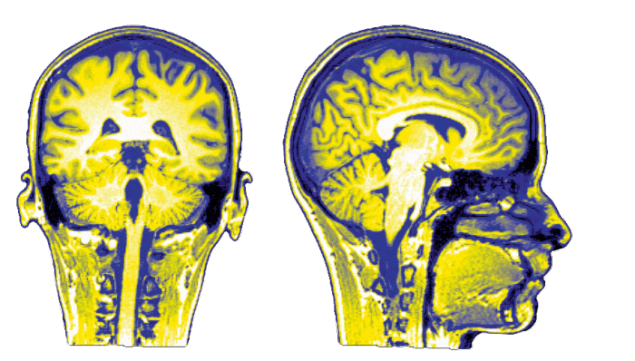
What does it all mean? Neurolinguistic studying how sensory-motor stereotypes help to understand the sentence. Usually in an experiment involving young children and adult bilinguals, who went from Russia to an English-speaking country in childhood. In addition, a similar test must also pass the 30 patients, partially or completely lost it. However, in this case, the researcher will study not sensory-motor stereotypes, and the localization of speech in aphasia. Aphasia is a systemic violation of the already formed speech, a disease not associated with damage to the vocal apparatus, namely with the defeat of the speech centers.
— Comparing the results of different patients with lesions in their brain, you can find an area critically involved in the implementation of a particular function of speech — explains Anna is the method.
How it looks really? Scientists have the results of functional MRI of each patient. They are used to build special programs three-dimensional model of the brain. Then this image is conventionally divided into voxels — areas with a volume of 1 mm3. Received for each patient the percentage of correct answers in the test, experts compare these voxels together. If the same errors coincide with the same affected brain areas, so this area is used when performing this type of speech task.
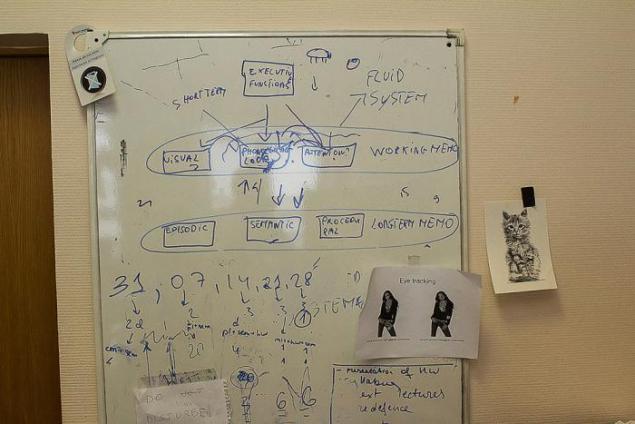
How to check Here I hear the phrase "boy touching a pencil pen." This action, and I immediately imagine: yeah, the first boy takes the pencil and then touches their hand. This is a direct motor stereotype. And then comes "the boy touches the handle with a pencil." It seems to be a direct order of words: understanding should be easier. But there is no direct motor stereotype, all the same, first take a pencil, and then touch their hand. Healthy adult, native speaker of Russian language, choose the picture corresponding to the spoken proposition just. But with children, bilingual and patient is different.
Results Child responds to direct motor stereotype (we first take up the subject, and then relate them to other items). And he'll make a mistake in the sentence "the boy touched the handle a pencil" by selecting the picture, where the boy touches it with a pencil pen.
— It turns out that the brain responds differently to the order of the words?
"Of course," welcomes Anna, my humble guess is a smile, kind elementary school teacher. — Young children have very concrete thinking — they start from a sequence of actions. And bilinguals on the contrary: they understand what action was done, but they have a problem with the instrumental case. And indirect order of words for them harder because they expect to hear a direct object, as in English.
As for me, I was useful in this experiment for measuring the speed of solving the tasks. Although, it seems, a couple times I definitely chose the wrong picture. Worried.
— I'm in the phonology, says Anna. — Just imagine: you put on the head cap and measure the electrical signal that the brain produces. He is very weak, so amplifiers are used. You hear "boy love pear" — a device immediately detects that your brain recognized the error. And if you give to listen to the same American, the sensors will show nothing. English people do not perceive this contrast of softness and hardness of consonants: "loved to love"...in the same Russian people will not distinguish the wheel (wheel) of veal (veal).
— So it is some different brains work.
— No, the mechanism of the brain all the same, — laughs Anna. — When a person is born, he has a lot of neurons. Gradually their specialties. The brain is very dependent on what is happening around it that becomes important. Six months children do distinguish phonetic contrasts in non-native languages, and then this superpower disappears, — says the scientist.
Why is all this necessary? At the same time a similar experiment patients of the speech pathology Center. Working with another employee of the laboratory of neurolinguistics Catherine spark.
— Tan... zu... o, you... PI...... em,...... em.
It may seem that the pretty blonde from Eastern Europe recently signed up for Russian language courses and now painstakingly learns the right verbs for a Friday night. Actually at the computer the patient who suffered a stroke. She looks at simple pictures and pulls from memory the appropriate word. For almost a year she remembers how to talk.
— Once-bra-si-VA-et — hesitantly concludes the woman looking at on the screen an old man in a field with a handful of seeds at the ready.
Specialists have a lot of different methods to restore speech. Now the patient is trained to call verbs, and neurolinguistic helped her remember the words and their synonyms. They're somewhere — they just need to be extracted. published
P. S. And remember, only by changing their consumption — together we change the world! ©
Join us in Facebook and in Vkontakte, and we're Classmates
Source: kot.sh/statya/246/tak-govoril-mozg

Experiment No. 1: "Boo, Boo, Boo..."My perception of the Room with the MRI so white and clean that it is difficult to distinguish the floor from the ceiling. This becomes even colder. Ring and belt with the buckle removed. Dentures I have not yet, a heart stimulant, too. Like ready. Throwing off the shoes, go barefoot on the tiled floor. Lie down on the couch. My head covered with a plastic lattice-like mask resembling a knight's visor. Stirring the head, as, indeed, other parts of the body, it is impossible. All I see is a reflection of the large screen with the text of the task in the system of small mirrors placed in front of me.
Put on the headphones connected to the neighbouring room with a thick rubber hose. Couch slowly drives into the machine.
Today I'm participating in one of the experiments scientific the neurolinguistics laboratory, HSE. Created just a few years ago, she brought together neuroscientists, linguists, speech therapists and even programmers, who are learning our language as a direct product of the brain.
How connected language and the brain, scientists are trying to understand for a hundred years. But the real revolution began in our time, when it became available scanners and other devices that enables detailed monitoring of brain function.
From these studies, two global problems. The first fundamental is to understand how neurons work in our head into words and sentences that we understand or pronounce. The second task applied to help people who have for brain disorders have problems with speech.

Probably the best way to see how the brain controls speech, is a functional magnetic resonance imaging, which accurately identifies what area of the brain is active and what is not.
In the tube of the MRI scanner can feel the solemn loneliness of an astronaut enclosed in a space capsule, which is about to explode to the stars. In an alarming rattle of machine imagining rapid pulse of the heart. He complained of buzzing all over the room, creating a magnetic field around me, and I can't get rid of the obsessive feelings that the machine is reading my thoughts.
The experiment starts.
— Say sentences about yourself — hear headphones quiet voice of the researcher.
"Now widow finishes cherry liqueur".
It is funny, but not much fun: spoil the statistics.
Then it gets worse: "Svaka wasurete plamika dasa shutlivo".
And finally, the climax: "Boo, Boo, Boo Boo buuuuuuu".

Honestly and quickly read syllables.
Between human suggestions, and almost psychedelic nonsense syllables on the screen each time for a few seconds calming crash simple crosses. In these moments of relaxation I can think of a lot of questions: why is the sentence funny? Out there do you see on the monitor as funny to me?
What does it all mean? If you are right handed, the area responsible for speech, you have most likely located in the left hemisphere. In the nineteenth century, scientists noticed that the speech disorder most commonly associated with lesions in the left half of the brain. However, around the same time was recorded exceptions to this rule: left-handers of the lesion parts of the brain on the left side did not cause any speech disorders. That is, the vast majority of right-handed earthlings speech "is" to the left. A significant proportion of the genetic left — right.
— Of course, it's not a whole meets only one hemisphere. In addition, she has, if I may say so, there are different levels of location. Phonetics, semantics and syntax can be localized in different hemispheres, explains responsible for this experiment, the neuroscientist Rosa Vlasova.
She was always very focused and tells about the brain as about old chess opponent, whose moves analyses for many years.

Alexander Luria , the Russian specialists working with the gray matter generally adhere to the teachings of the famous Soviet scientist and founder of Russian neuropsychology, Alexander Luria. According to his concept, any mental function is a system that is re-harvested each time depending on the conditions in which proceeds human activity and what its job is.
The difference found in the organization of speech in right-handers and most left-handers, gives limitless expanse for new hypotheses and possibilities for experimentation. Sixty years ago, the founder of Russian neuropsychology, Alexander Luria received, for example, the following data: right-handed, whose family tree has relatives or ancestors with the leading left hand after brain damage regain it faster compared to right-handers, whose families left-handers and there was not.
The purpose of the experiment with the MRI — to confirm the available evidence that the speech in right-handers with familial left-handedness "located" differently than right-handers without it.
How to check When I'm lying in the pipe, region of the brain involved in the task, begin to work actively, and hence are very active to eat is to absorb oxygen. To these sites begins to see an influx of blood rich in glucose and oxygen. However, since the oxygen (oxide hemoglobin) to flow in abundance, he is not completely consumed and accumulates in the venous blood near working cells. Oxygenated hemoglobin has paramagnetic properties, and using fMRI you can see which of the sections of my brain are currently active.
Why such a complex experiment design: clear suggestion, then incomprehensible, and then another, and syllables?
Scientists are looking for a kind of pure speech, but when you do the job, aktiviziruyutsya attention and visual perception, and even hidden articulation. So there, the test conditions — those strange sentences with non-existent words. When a person reads these pseudophase, areas of visual perception and the hidden articulations are approximately in the same way as in the normal range. But the areas responsible for the semantics, i.e. the meaning of the words is not involved, because these words simply do not exist. Thus, comparing these conditions, scientists find areas responsible for the sense of the words: they glow brighter when we read the usual suggestions.
Over these strange pseudotrisomy was not a linguist. First, all words cited in the initial shape, then removed all morphological features, then the combined syllables so that they did not develop in pseudoloma similar to the real thing.
Noughts and syllables in this experiment — kind of the perfect benchmarks, which compares brain activity at the time of execution and failure of the task.

Of course, take literally the thoughts according to the fMRI can not (phew!), but what sort of apparatus all the same blab. Guess what I was curious about you drawing attention to the activation of the areas responsible for attention. It's easy to calculate the subject who fell asleep. Although, they say, in some experiments, and to sleep is not a sin. For example, in phonological. The brain will work without your direct involvement. You headphones pour the syllables "BA-BA-BA-BA", and then a sudden "PA!" and the experimenter will immediately understand that the brain is an audible difference noticed if you see the tenth dream about aliens.
Results While this difficult experiment is in the development stage. It turned out that different subjects should be produced by different control conditions. And someone has to do, instead of faithfully reading the syllables, just sings them to herself.
— When some of the subjects we see activation in the temporal lobe of the right hemisphere instead of the left, once it becomes clear what it is. There is a dichotomy: with the defeat of the left temporal lobe there is a speech, whereas some lesions in the right temporal lobe — impaired perception of music. Well, we asked you was not sang by chance? — shrugs rose, surprising me with his detective skills.
My scan came through a week. Turns out my it lives in the right hemisphere, despite the fact that I am right-handed citizen without grandmothers and grandfathers left-handers. So the results of the experiment the scientists I'm probably spoiled. The brain can and so. At least my brain.
Experiment No. 2. How to lose the gift of speechMy feelings — What are you so bald on the monitor is spinning?
— Your skull — cheerfully greets me student of pigface HSE Intern researcher at the laboratory of neurolinguistics Zoya Cherkasova. — Now we compare the 3D image to a computer program with your head in the real world.

Looks not very pretty — well, with a hairstyle under a zero wait a little while.
Laboratory for cognitive studies — a small room office, where barely fit a dozen students. Never guess what here doing cool experiments.
The wall is a tremendous snow-white chair of the test — exactly-in-exactly in the dentist's office. Only here for fun. First, it does not hurt. Secondly, it is not boring: the laboratory is in constant motion. Sit down.
Here the young doctor thoughtfully rotates on the monitor in multi-colored 3D coordinates of some pink squiggles.
— What you have a beautiful brain! — admires his colleague.
That's because he's faux — sigh black-eyed scientist.
Zoe clips on my forehead, small gray beads, through which the camera "sees" my head. According to its accurate geographical coordinates of the computer program, to compare with "entrails" of the brain image was obtained in the experiment with the scanner.

Now experimenters need to understand the force with which at me can be hit with a magnetic pulse.
And for this I need to connect to the appliance: the left arm electrode attaches Zoe, on the right is the main controller of the local superoperator a Sicilian, Matteo Feurra. It can rather be mistaken for a designer fashion house Romeo Gigli, than for the associate Professor of the faculty of social Sciences. The scientist had a choice to teach in Spain, Germany or Russia, and in the end, he went to Moscow, because here was the best equipped lab. Here is generally a lot of foreigners for this reason. Here to the fridge rapidly approaching the Montenegrin Nikola Vukovic. "No beer," the mysterious, as if some secret password, he says in Russian across the room, slams the door and disappears with a lot of drugs.
— Discharge! — twitching hand, jumps on the monitor chart.
The scientists nod to each other knowingly — apparently he found that the force of impact at which the signal can break through the skull to the bodies of neurons, and I'm not hammered in convulsions.
Matteo solemnly gives Zoe a big black solenoid coil. It is similar to a thick monocle with divisions.
Now look at the scalp! — command of Italian.
Zoe obediently leads thing on my mind.
So, two hours of preparation, and you can begin the experiment.
I sit in my chair, with me is Zoe with the coil, I monitor with the task. Around the audience.

My job is to call out nouns and verbs according to the pictures. What could be easier?
Pictures flashed on the monitor with frightening speed.
A shovel and a beacon I called immediately, but the fire extinguisher and easel out of my head completely.
Verbs even more interesting: a man feels a woman up the ass, man choking man with a rope...
The first round is over. Now I will say the words while under the influence of a magnetic field.
This Behemoth!
I clearly see an animal on screen, but Zoe suddenly treacherously shoots me in the head electromagnetic bullets — BAM-BAM-BAM! I'm trying to say the word, but my fat Hippo blown in articulating the impotence somewhere on the way from the brain to the tongue. It's like a monologue with a headwind, when some invisible force like scores all the words back in your mouth. I'm, like, speechless — nothing to say!

What does it all mean? The point of this experiment is also associated with left-handedness. If in the chair the subject is sitting classical right-handed, the speech functions concentrated in the left hemisphere, then when you disable zone Brock he got worse to call verbs, because at this point, the test block region responsible for motor skills. And when he sends the pulse to the zone of Wernicke is worse to deal with nouns. It is also clear that if left-handers have speech centre is on the right, and brake when they have impact on the right hemisphere.
How to check so attached to my forehead sensors and associating the camera with fMRI data, which were already in a computer program, the researchers asked the coordinates of the desired speech zones in the program and determined their location in my head. Then found out how hard it is possible to stimulate selected points in the brain, by measuring the threshold of sensitivity that all people are different and depends on the degree of fatigue and the thickness of the skull bones.
The method of transcranial magnetic stimulation (TMS) on the impact on the cerebral cortex with short magnetic pulses, resulting in \ \ broken the local processing of information. In short, TMS affects the brain temporarily, allowing you to disable some of its area (in a healthy person) and analyze how this affects speech.

About the possibility to influence the brain using electromagnetic fields, scientists said at the beginning of the XX century. But serious experiments with transcranial magnetic stimulation began in the mid-90s (primarily in the treatment of mental illness), and in Russia this technique was legalized by the Ministry of health less than two years ago.
The results Here, in contrast to the previous experiment, results for a long time did not have to wait.
— You have some reason problems arise with the naming during stimulation of vertex, says Zoe, confused lowering the coil. Actually there is no speech zones. It's the center of the head, we wanted to use as a reference point...
So my brain replays we scientists have with the score 2:0.

Experiment No. 3 "the Mistress breaks a vase with a plate"My feelings Senior researcher of the laboratory of neurolinguistics Anna Krabis — graceful and delicate, which probably needs to be a girl, professionally looking in someone else's brain. In a small laboratory at the Moscow Center of speech pathology she slowly writes in the history of science different patients with speech disorders. Well, today I will take part in one of her experiments.
Again I'm looking at a computer monitor, but this time I have to do job independently devices — you can spin and grimace, you are no wires or cold pipe of the imager.
On the keyboard two buttons. The red and blue. With their help, this task is performed by the patients of the Center, which, as a rule, after the injury can choose to answer slowly and only with one hand.
— Your task is to listen to the sentence and quickly choose the corresponding picture.
Go!
"Mistress smashes a vase plate".
On the monitor two drawings of a woman, equally, indifferently destroying the dishes. She left pounds a vase on the plate. To the right is the plate on the vase.
"Grandpa hides behind the drawer glass".
The old man in the picture clearly cherishes their simple belongings, unlike the Housewives of the vase.
"The wife of a policeman erases".
"The gardener puts on the barn Board."
"Mistress scratches the Cabinet with a screwdriver".
And so twenty times.

What does it all mean? Neurolinguistic studying how sensory-motor stereotypes help to understand the sentence. Usually in an experiment involving young children and adult bilinguals, who went from Russia to an English-speaking country in childhood. In addition, a similar test must also pass the 30 patients, partially or completely lost it. However, in this case, the researcher will study not sensory-motor stereotypes, and the localization of speech in aphasia. Aphasia is a systemic violation of the already formed speech, a disease not associated with damage to the vocal apparatus, namely with the defeat of the speech centers.
— Comparing the results of different patients with lesions in their brain, you can find an area critically involved in the implementation of a particular function of speech — explains Anna is the method.
How it looks really? Scientists have the results of functional MRI of each patient. They are used to build special programs three-dimensional model of the brain. Then this image is conventionally divided into voxels — areas with a volume of 1 mm3. Received for each patient the percentage of correct answers in the test, experts compare these voxels together. If the same errors coincide with the same affected brain areas, so this area is used when performing this type of speech task.

How to check Here I hear the phrase "boy touching a pencil pen." This action, and I immediately imagine: yeah, the first boy takes the pencil and then touches their hand. This is a direct motor stereotype. And then comes "the boy touches the handle with a pencil." It seems to be a direct order of words: understanding should be easier. But there is no direct motor stereotype, all the same, first take a pencil, and then touch their hand. Healthy adult, native speaker of Russian language, choose the picture corresponding to the spoken proposition just. But with children, bilingual and patient is different.
Results Child responds to direct motor stereotype (we first take up the subject, and then relate them to other items). And he'll make a mistake in the sentence "the boy touched the handle a pencil" by selecting the picture, where the boy touches it with a pencil pen.
— It turns out that the brain responds differently to the order of the words?
"Of course," welcomes Anna, my humble guess is a smile, kind elementary school teacher. — Young children have very concrete thinking — they start from a sequence of actions. And bilinguals on the contrary: they understand what action was done, but they have a problem with the instrumental case. And indirect order of words for them harder because they expect to hear a direct object, as in English.
As for me, I was useful in this experiment for measuring the speed of solving the tasks. Although, it seems, a couple times I definitely chose the wrong picture. Worried.
— I'm in the phonology, says Anna. — Just imagine: you put on the head cap and measure the electrical signal that the brain produces. He is very weak, so amplifiers are used. You hear "boy love pear" — a device immediately detects that your brain recognized the error. And if you give to listen to the same American, the sensors will show nothing. English people do not perceive this contrast of softness and hardness of consonants: "loved to love"...in the same Russian people will not distinguish the wheel (wheel) of veal (veal).
— So it is some different brains work.
— No, the mechanism of the brain all the same, — laughs Anna. — When a person is born, he has a lot of neurons. Gradually their specialties. The brain is very dependent on what is happening around it that becomes important. Six months children do distinguish phonetic contrasts in non-native languages, and then this superpower disappears, — says the scientist.
Why is all this necessary? At the same time a similar experiment patients of the speech pathology Center. Working with another employee of the laboratory of neurolinguistics Catherine spark.
— Tan... zu... o, you... PI...... em,...... em.
It may seem that the pretty blonde from Eastern Europe recently signed up for Russian language courses and now painstakingly learns the right verbs for a Friday night. Actually at the computer the patient who suffered a stroke. She looks at simple pictures and pulls from memory the appropriate word. For almost a year she remembers how to talk.
— Once-bra-si-VA-et — hesitantly concludes the woman looking at on the screen an old man in a field with a handful of seeds at the ready.
Specialists have a lot of different methods to restore speech. Now the patient is trained to call verbs, and neurolinguistic helped her remember the words and their synonyms. They're somewhere — they just need to be extracted. published
P. S. And remember, only by changing their consumption — together we change the world! ©
Join us in Facebook and in Vkontakte, and we're Classmates
Source: kot.sh/statya/246/tak-govoril-mozg
Tags
See also
"Yikes!" The story of how Nassim Taleb has made the inevitable disaster in the investment strategy
"Yikes!" The story of how Nassim Taleb has made the inevitable disaster in the investment strategy
"Yikes!" The story of how Nassim Taleb has made the inevitable disaster in the investment strategy
"Yikes!" The story of how Nassim Taleb has made the inevitable disaster in the investment strategy
How to embarrass a scientist: a psychologist, an economist and a physicist about what questions they are afraid
The brain is not a computer!
CIBER experiment or story about how scientists found the second half of the Universe
Got Milk? The story of how boring and nasty milk gained States
Chronicles of sabotage units







